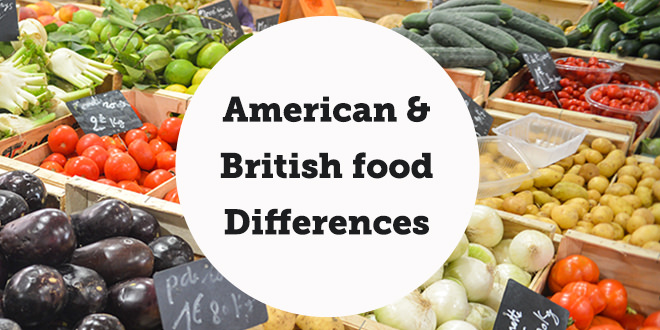Hey ABA friends!
English can often be complicated enough without have to complicate things any more, right? You know us, we love to make things complicated for absolutely no reason whatsoever and we have gone and done it again with foods.
In today’s post we are going to look at foods which depending on where you live or visit have different names. In the United States and the United Kingdom there are several foods which have different names depending on which side of the Atlantic you are on and today we are going to take a look at some of them.
1
United Kingdom = Aubergine
United States = Eggplant
There are different ideas as to why this food has more than one name, although it is believed that the British call it aubergine due to the French who adapted it from Catalan and Spanish after the Arab conquering many moons ago.
2
United Kingdom = Biscuit
United States = Cookie
Again, why are there 2 words for the same food? It is speculated that the American word comes from the Dutch word “koekje” which could have been due to Dutch colonisation many moons ago.
3
United Kingdom = Rocket
United States = Arugula
Why may there be differences in this instance? It can be assumed that the British say “rocket” due to their close proximity to France where the word is “roquette”. Americans on the other hand like to use the Italian word “arugula” almost as if to maintain its heritage. Fair play to the Americans on this one.
4
United Kingdom = Courgette
United States = Zucchini
With this vegetable, the word used by the British- “courgette”, is of French origin and is actively used in the New Zealand, South Africa and obviously France. On the other hand, “zucchini” comes from the Italian word “zucchino” which means small squash. This word is common used in large English speaking areas including the United States, Canada and Australia.
5
United Kingdom = Prawn
United States = Shrimp
Generally the words “prawn” and “shrimp” are used interchangeably in modern English to refer to the same type of crustacean. There apparently is a difference in their definition however, with prawns being slightly larger than shrimp and tending to have pairs of pincers on three sets of their legs whereas shrimp only tend to have pairs of pincers on two sets.
Which one is correct?
Both of them are! As we can see, the English language is full of variety and at times throughout its development, has been heavily influenced by many other languages including French and Italian to name but a few. There are many more differences that we haven’t had the chance to talk about today but if you know any more, we would love you to tell us about them!
Happy eating (and studying)!!

 ABA Journal The digital English academy
ABA Journal The digital English academy




